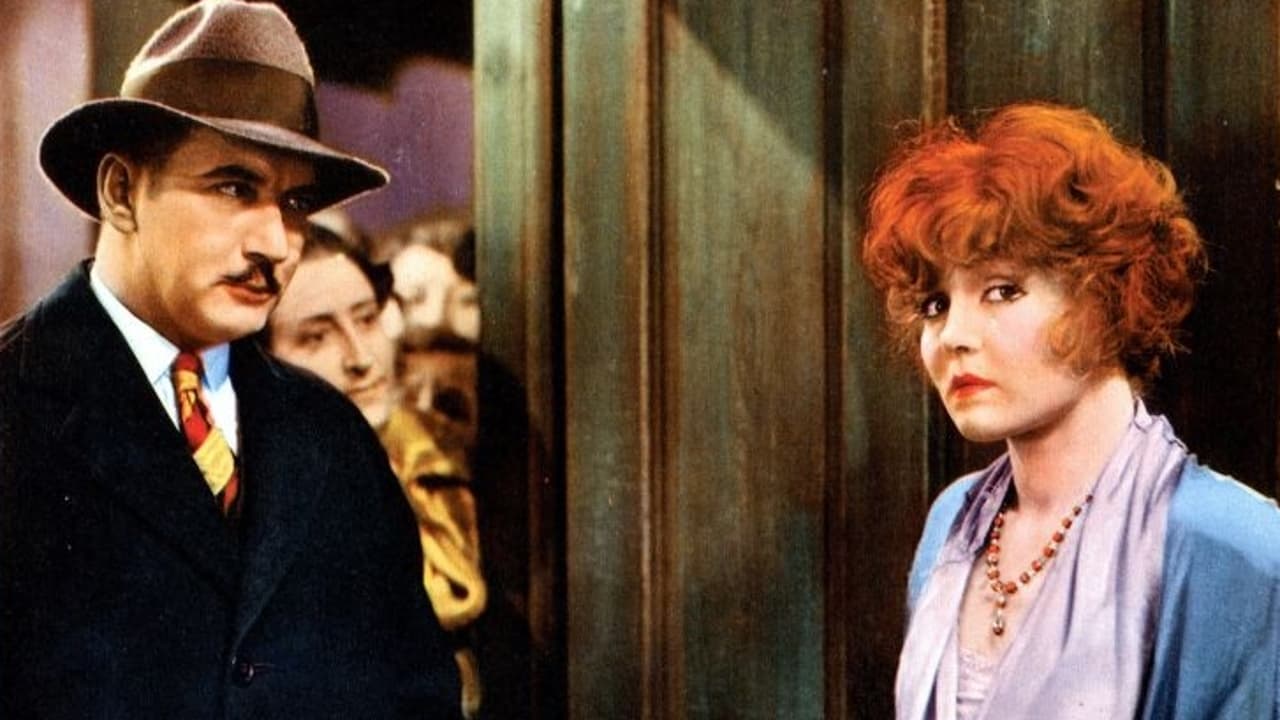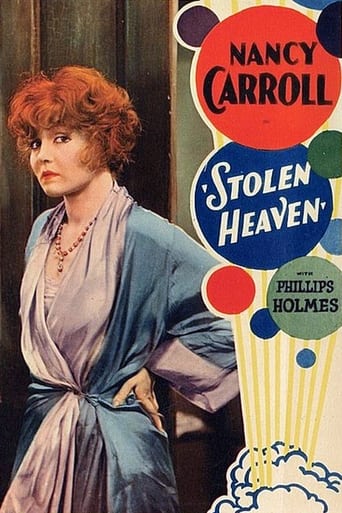

Prostitution, suicide, larceny, conniving idle rich--a gritty pre-Code item about two down-on-their-luck misfits who acquire some ill-gotten gains, make a suicide pact, and fall slowly, quite convincingly in love. Carroll, at the peak of her powers, is utterly natural and appealing as a not-that-nice girl, and she plays well against Louis Calhern, in an early rich-cad role. George Abbott was more of a stage than movie director, but he sure shows his acumen with actors here. Even Holmes, who was often too pretty and too whiny to be a convincing leading man, miscast as he is here, is convincing. There's some fine early-talkie camera-work and a surprisingly modern, almost existential gloom to the material. It doesn't cheat its way to an entirely happy ending, and it's one of the best showcases for Carroll's talent I've seen.
... View MoreRain dampening business, streetwalking Nancy Carroll (as Mary) heads up to her New York apartment with what she believes is a handsome young drunk. Instead, Phillips Holmes (as Joe Bartlett) turns out to be a thief with a head wound. Correctly sensing Holmes is a soul-mate, Ms. Carroll covers for him when police search the apartment building. Agreeing they both have no real future, the pair decide to spend the $20,000 he has stolen, then commit suicide. They go to Palm Beach for their last hurrahs There, love complicates matters "Stolen Heaven" scores points for re-teaming Carroll and Holmes, so promising in "The Devil's Holiday (1930), and a good opening. But, it's downhill from there. As the madcap couple frolic in Florida, you begin to see some serious strains in the script. Co-stars Carroll and Holmes often appear directionless and/or under-rehearsed but blocked. The script, obviously not written for its stars, needed a revision. And, don't expect any reason on Earth for its main characters to be named "Mary" and "Joseph".***** Stolen Heaven (2/21/31) George Abbott ~ Nancy Carroll, Phillips Holmes, Louis Calhern, Edward Keane
... View MoreThe first scene is startling - two shadows walk past an old billboard advertising Wonder Bread - "sliced - just say Wonder cut". Mary is a street walker - her mannerisms show that she is new to it. Later on she explains that she was a dancer who lost her place and this is her first night on the job. Joe is a young man Mary first assumes to be drunk - then she notices blood in his hair. He has committed a robbery - he has $20,000 and wants to live life to the full, then when the money runs out he will shoot himself. Mary helps divert the police by putting him in bed and pretending he is a customer - even by pre-code standards it is pretty racy.He asks Mary to go with him, and that's when it falls flat. It loses its grittiness when they start to live it up at a Palm Springs resort. Something went wrong with the story about 2 down and outers who grab their chance of happiness regardless of the price.The establishing shot of the resort is great - firstly showing the orchestra and lastly the dance floor, where Mary (with a beautiful new look) and Joe are dancing. Nancy Carroll is absolutely gorgeous whether as a down on her luck dancer or among the idle rich. She has a few really good scenes - when she is trying to convince the police Joe is just a customer, when she is reminiscing about her life, telling Joe what she wants out of life and the sequence where she gambles her last $1,000, thinking it is her last night on earth.Even though with 3 films together ("The Devil's Holiday", "Stolen Heaven" and "The Man I Killed") they were a team (sort of) Holmes didn't seem very comfortable in their scenes together. Nancy came up trumps but Holmes struggled and made the dialogue ("they'll never take me alive") sound trite which it was. May be he was out of his depth. Frederic March would have made a much more believable Joe. Nancy and Phillips certainly win the award as the most beautiful couple in the movies. Louis Calhern does well as the cad that comes good.Recommended.
... View MoreInteresting pre-coder directed by famous stage director, George Abbott, and with several excellent scenes.Nancy Carroll plays a hooker who gets followed by a young man through an ugly and shadowy city. She thinks he's drunk (Phillips Holmes) but is turns out he's been wounded in a robbery of a radio factory where he used to work. As the police swarm into the seedy tenement, she decides to help him and the two forms an uneasy alliance culminating in a suicide pact.He's gotten $20,000 and they decide to go out on a high note, blowing all the money and then killing themselves. Both have been beaten down by life. They escape to Palm Springs where we catch up with them in a great shot that starts with a marimba band and slowly pulls back to reveal the lush resort filled with fashionable people. Then we spot the young couple on the dance floor, immaculately dressed and rubbing elbows with the rich. Louis Calhern plays a rich lech who's after Carroll.But the cops track them down as they are about out of money. They must decide on their agreed-to suicides or to keep running or go back and pay for their "crimes." Calhern gets involved in the conclusion.Carroll and Holmes are quite good even when they're overacting, just because the story is so surreal. The moral of the story seems to be that life is good as long as there is plenty of money. But is it?
... View More